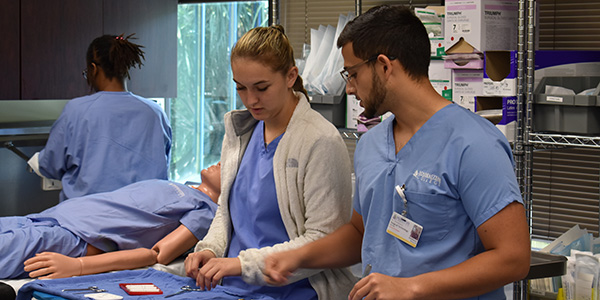SEC’s First Bachelor’s Degree Program Addresses Florida’s Critical Need for Qualified Nurses
June 24, 2020 / 6:09 pm / s.han
Southeastern College has introduced a new Bachelor of Science in Nursing (BSN) at its Miami Lakes campus to address Florida’s critical need for qualified nurses. The addition of the new BSN program marks the first time Southeastern College will offer a bachelor’s degree in any of its academic programs.
“We’re extremely proud to begin offering this BSN program to provide a vital next step for registered nurses,” said Robert Keiser, Southeastern College Executive Director. “Southeastern College has a proud tradition educating allied health workers, and we’re excited to expand our degree offerings to help meet the critical healthcare needs of Florida and those looking to further their nursing education.”
Southeastern College’s Bachelor of Science in Nursing degree is designed for licensed registered nurses (RNs) who possess an associate degree in nursing (ASN). Graduates of the BSN program will be prepared to provide compassionate, patient-centered, culturally competent nursing care to individuals, families, and communities in a variety of settings using evidence-based knowledge and skills to improve healthcare outcomes.
“Our BSN program will allow registered nurses to take the next step in their healthcare career,” said Kesier. “They will practice in partnership with patients as members and leaders of professional healthcare teams, utilizing the most current healthcare technologies.”
Despite a 2020 analysis by registerednurses.org which reports Florida will have a nursing surplus by 2030, organizations throughout the state continue to prepare for shortage of qualified nurses. According to the Florida Center for Nursing, more than 40 percent of Florida nurses are approaching retirement age by 2030, leaving the state to face a shortage of RNs that could severely impact the state’s healthcare system and medical care for Florida residents.
According to the American Association of Colleges of Nursing (AACN), the U.S. is projected to experience a shortage of RNs that is expected to intensify as baby boomers age and the need for health care grows. Adding to the dilemma is a nursing workforce in which 1 million registered nurses will reach retirement age within the next 10 to 15 years according to the Health Resources and Services Administration.
“Florida’s population continues to grow and the demand for nursing personnel will increase as the state’s baby boomers reach retirement age,” said Keiser. “We hope to play our part in preparing the next generation of nurses by providing this comprehensive nursing education program.”
To receive a BSN from Southeastern College, students must complete a total of 120.0 semester credit hours. The curriculum is designed for graduates of associate degree programs in nursing who have satisfied a total of 73.5 semester credit hours, 30 credit hours of general education and 43.5 credit hours for RN licensure. Students will take an additional 46.5 credits of coursework that emphasizes critical thinking, leadership, research, physical assessment, and health prevention and promotion across a variety of healthcare settings.
Southeastern College’s new BSN is currently enrolling at its campus in Miami Lakes, FL. For more information, visit https://www.sec.edu/academic-program/undergraduate/rn-to-bsn/ or call (305) 820-5003.

